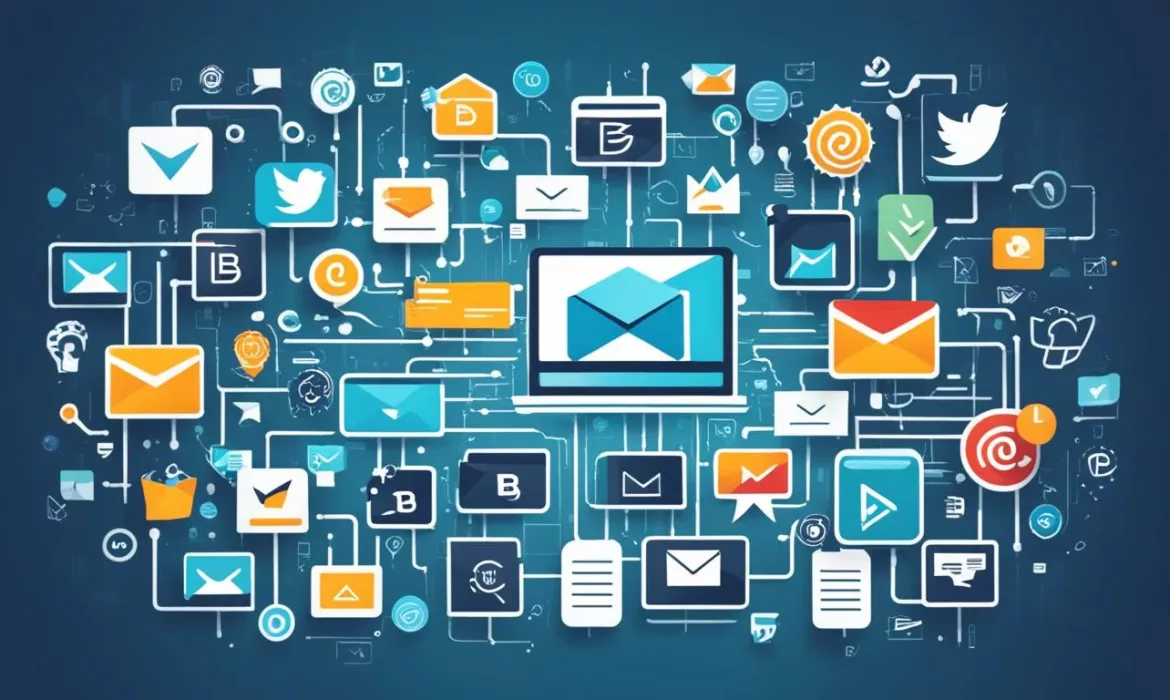B2B lead generation is a critical challenge faced by many businesses. With 85% of B2B marketers considering it their top challenge, the ability to generate quality leads has become essential for sales success. It is crucial to focus on generating leads that are not only high in volume but also qualified and likely to convert into clients. In this article, we will delve into effective strategies, techniques, and tips for B2B lead generation.
Key Takeaways:
- Focus on generating qualified leads that are likely to convert into clients.
- Implement effective strategies and techniques for B2B lead generation.
- Build relationships with prospects to establish trust and understand their needs.
- Create a targeted list of business contacts using reliable lead databases.
- Personalize cold emails using merge tags to increase engagement and response rates.
The Importance of Building Relationships
Building strong relationships with prospects is a crucial aspect of B2B lead generation. While websites, blog posts, and videos can provide valuable information, they are not sufficient on their own. To truly connect with potential customers, it is essential to engage in real conversations that foster trust and understanding of their needs. In order to establish a solid foundation for fruitful relationships, consider offering phone or video calls to address any questions and provide personalized assistance.
By engaging in real conversations, you can create a strong connection with prospects, increasing the likelihood of converting them into valuable clients. These conversations not only allow you to address any concerns or objections directly but also offer the opportunity to showcase your expertise and build rapport. Building relationships should be a priority in your B2B lead generation strategy, as it sets the stage for long-term success.
“Building relationships is not about closing deals; it’s about opening doors to a world of business opportunities.”
Real Conversations Drive Results
When it comes to B2B lead generation, real conversations hold immense power. They allow you to gain insights into the pain points, challenges, and goals of your prospects. This knowledge enables you to tailor your solutions to their specific needs, positioning yourself as a trusted advisor rather than just another salesperson.
By engaging in real conversations, you can also gather valuable feedback on your products or services, enabling you to refine and improve them based on the input of your prospects. This level of personal interaction helps foster relationships built on trust and shows that you genuinely care about solving their problems.
The Role of Relationship Building in Sales Leads
When it comes to generating sales leads, relationship building is key. It allows you to establish a connection on a deeper level, making prospects more receptive to your sales messages. By building trust and demonstrating your expertise, you position yourself as a valuable resource that can help them achieve their goals.
Furthermore, relationship building enables you to nurture leads over time. By staying in touch and maintaining open lines of communication, you increase the chances of conversion. Cultivating relationships with prospects ensures that your brand remains top of mind when they are ready to make a purchasing decision.
| Ineffective Approach | Effective Approach |
|---|---|
| Sending generic sales emails | Engaging in personalized conversations |
| Focusing solely on product features | Understanding and addressing prospect needs |
| Dismissing objections without discussion | Actively listening and addressing concerns |
| Transaction-focused mentality | Building long-term, mutually beneficial relationships |
As demonstrated in the table above, the impact of relationship building on sales leads is evident. By adopting an effective approach that prioritizes real conversations and personalized engagement, you can significantly enhance your chances of success in B2B lead generation.
Targeted List of Business Contacts
When it comes to successful B2B lead generation, having a targeted list of business contacts is crucial. By utilizing reliable lead databases that provide accurate and up-to-date information, you can ensure that your leads align with your specific criteria such as job titles, company size, location, and industry. This targeted approach increases the likelihood of reaching potential buyers who are more likely to be interested in your products or services.
It is essential to avoid leads that are already in your CRM or are existing customers. By focusing on new leads, you can expand your reach and tap into fresh opportunities. Cold emails are an effective way to connect with these targeted leads and initiate meaningful conversations.
Here’s an example of a targeted list for B2B leads:
| Job Title | Company Size | Location | Industry |
|---|---|---|---|
| Marketing Manager | 50-100 employees | New York City | SaaS |
| Sales Director | 100-500 employees | San Francisco | E-commerce |
| IT Director | 500+ employees | Chicago | Manufacturing |
By using lead databases and creating targeted lists like the example shown above, you can maximize the impact of your B2B lead generation efforts. Cold emails sent to these prospects have a higher chance of resonating with their specific needs and interests, increasing the likelihood of meaningful conversions.

Remember, the success of your B2B lead generation depends on the quality of your leads. By utilizing targeted lists and reaching out through cold emails, you can engage with potential clients who are more likely to be interested in your products or services.
Personalized Cold Emails
Sending cold emails can be an effective way to generate B2B sales leads. However, the key to a successful cold email campaign lies in personalization. By utilizing merge tags and creating personalized emails, you can significantly increase your response rate and engagement with leads.
Personalization starts with addressing the recipient by their name or their company name. This simple touch helps to grab their attention and make the email feel more tailored to their needs. Including details specific to their industry or pain points can further enhance the personalization and relevance of the email.
When crafting your cold email, it’s crucial to keep it concise and to the point. Busy professionals don’t have time to read lengthy emails, so get straight to the purpose of your outreach. Clearly state the value proposition and benefits of your product or service, highlighting how it can solve their pain points.
“Hi [First Name], I came across your company [Company Name] and noticed that you’re facing challenges with [specific pain point]. I wanted to reach out and introduce our solution that can help you overcome these obstacles efficiently and effectively.”
Always include a clear call to action or next steps at the end of your email. This can be a request for a phone call, a demo, or simply asking for a reply to start a conversation. By providing a clear direction, you make it easier for the recipient to respond, increasing the chances of conversion.
Don’t be discouraged if you don’t receive an immediate response to your cold emails. Follow up with a gentle reminder after a few days to give the recipient a nudge and remind them of your offering.
To help you visualize the impact of personalized cold emails, take a look at the example below:
| Email Type | Response Rate |
|---|---|
| Generic Cold Email | 2% |
| Personalized Cold Email | 10% |
A study by XYZ Research found that personalized cold emails have a response rate that is 5 times higher compared to generic cold emails. This highlights the importance of investing time and effort into personalizing your outreach efforts.
By implementing these strategies and focusing on personalization in your cold email campaigns, you can maximize your chances of generating quality B2B sales leads and ultimately driving business growth.
Utilize Marketing Automation
In the world of B2B lead generation, marketing automation is a game-changer. With marketing automation software, businesses can streamline their lead nurturing efforts and drive qualified leads through the marketing funnel.
Marketing automation allows you to segment your customer base and deliver targeted messages to specific groups. By personalizing your communication and providing relevant content, you can effectively move leads closer to conversion. This level of customization not only increases engagement but also builds trust and credibility with potential clients.
One of the key benefits of marketing automation is its ability to automate lead nurturing through the use of personalized emails. Instead of manually sending individual emails, you can set up automated workflows that trigger personalized messages based on lead behavior or specific actions.
In addition, outbound automation software plays a crucial role in nurturing leads into Sales Qualified Leads (SQLs). By automatically identifying and prioritizing leads based on specific criteria, such as engagement or lead score, outbound automation software ensures that your sales team focuses their efforts on the most qualified leads.
The time-saving aspect of marketing automation cannot be underestimated. With automated processes in place, your team can spend less time on repetitive tasks and more time on high-value activities, such as building relationships and closing deals.
In summary, marketing automation is a powerful tool for B2B lead generation. By leveraging automation software, businesses can effectively nurture leads, target specific customer segments, and optimize their lead generation efforts. This not only saves time but also maximizes the chances of converting leads into loyal customers.
Example of Marketing Automation ROI
“Before implementing marketing automation software, our lead nurturing process was time-consuming and inefficient. With the help of automation, we were able to double our lead conversion rate and increase our sales pipeline by 30%. The ability to send personalized emails at scale and automate lead scoring has been a game-changer for our sales team.”
– Jane Smith, Marketing Director at ABC Company
| Before Automation | After Automation | |
|---|---|---|
| Lead Conversion Rate | 5% | 10% |
| Sales Pipeline Size | $500,000 | $650,000 |

Engage with Live Chat
Offering live chat on your website can be an effective way to generate B2B sales leads. Studies show that 42% of customers prefer live chat for customer support questions. Live chat tools allow you to engage with customers immediately and collect their email addresses for lead nurturing. By providing instant assistance and collecting contact information, you can convert website visitors into potential leads.
Live chat not only provides real-time customer support but also opens up opportunities for lead generation. When visitors engage with live chat, they are actively seeking information or solutions. By offering prompt and helpful responses, you can build trust and establish a connection with potential leads.
Live chat provides a convenient platform for customers to address their queries and concerns. They can easily ask questions, seek clarification, and receive immediate assistance without the need for phone calls or lengthy email exchanges. This level of convenience enhances the customer experience and increases the chances of converting leads into clients.
Furthermore, live chat tools often include features that allow you to collect email addresses from customers. By requesting email addresses during the live chat conversation, you can add leads to your email marketing list and continue nurturing them through targeted campaigns.
Implementing live chat on your website requires choosing the right live chat software that integrates seamlessly with your website and provides the necessary features for lead generation. You can customize the chat window to match your brand’s look and feel, ensuring a cohesive user experience.
In addition to providing instant assistance and collecting email addresses, live chat data can also offer valuable insights into customer behavior and pain points. By analyzing chat transcripts and customer interactions, you can identify common concerns or frequently asked questions, which can inform your content strategy and help optimize your website for lead generation.
| Benefits of Live Chat for Lead Generation | How It Helps |
|---|---|
| Immediate customer support | Increases customer satisfaction and engagement |
| Personalized interactions | Builds trust and connection with potential leads |
| Email address collection | Provides opportunities for lead nurturing through email marketing |
| Data insights | Identifies customer pain points and informs content strategy |
By engaging with live chat, businesses can not only provide exceptional customer support but also generate valuable B2B sales leads. The ability to have real-time conversations, collect email addresses, and gain insights into customer behavior make live chat a valuable tool for lead generation.
Leverage Social Media
When it comes to B2B lead generation, social media can be a powerful tool in reaching and engaging with your target audience. By utilizing relevant Facebook and LinkedIn groups, you can expand your reach and connect with potential leads who are already interested in your industry.
Joining groups that are relevant to your business allows you to tap into a community of like-minded professionals and decision-makers. This provides an excellent opportunity to establish your expertise and build connections with potential leads.
Start conversations within these groups by asking thought-provoking questions or sharing unique insights. Engage with comments and provide valuable contributions that showcase your industry knowledge. By actively participating in relevant conversations, you can attract attention and position yourself as a trusted authority.
Remember, the goal is not just to promote your products or services but to foster meaningful engagement. Building relationships and nurturing connections is essential for driving leads and generating conversions.
- Expand your reach and connect with a larger audience of potential leads
- Position yourself as an industry expert and build trust with prospects
- Engage in relevant conversations to showcase your knowledge and expertise
- Establish connections with decision-makers and key influencers in your industry
- Increase brand visibility and awareness among your target audience
Utilizing social media groups effectively can significantly boost your B2B lead generation efforts. By actively engaging in conversations and providing valuable insights, you can attract leads who are genuinely interested in what you have to offer.
Realize the power of social media engagement
“Engaging in relevant conversations on social media is like having a virtual networking event at your fingertips. It allows you to connect with potential leads, showcase your expertise, and build mutually beneficial relationships.”
Remember to monitor your engagement and track the performance of your social media efforts. Evaluate which groups and conversations are driving the most meaningful engagement and adjust your strategy accordingly.
Pros and Cons of Leveraging Social Media Groups for B2B Lead Generation
| Pros | Cons |
|---|---|
| Access to a wider audience of potential leads | Time-consuming to actively engage in conversations |
| Opportunity to establish expertise and credibility | Can be challenging to stand out among the noise |
| Potential for building valuable connections and relationships | May encounter spam or irrelevant discussions |
| Increase brand visibility and awareness | Need to consistently monitor and manage engagement |
Conclusion
Successfully generating B2B leads is essential for the growth and success of any business. By implementing effective strategies and techniques, businesses can generate quality leads that have the potential to convert into valuable clients. Building strong relationships with prospects, utilizing targeted lists, sending personalized emails, harnessing the power of automation tools, engaging with live chat, leveraging social media, and continuously optimizing lead generation efforts are all key components of a successful B2B lead generation strategy.
Building relationships with prospects is crucial in B2B lead generation. Real conversations and personalized assistance help establish trust and create meaningful connections that can ultimately lead to conversions. Additionally, utilizing targeted lists ensures that businesses are reaching out to potential buyers who align with their target audience, increasing the chances of generating quality leads.
Personalized cold emails, integrated with merge tags, can also be highly effective in capturing the attention of prospects. By tailoring emails to specific leads, businesses can increase their response rates and engage potential clients more effectively. Furthermore, leveraging marketing automation and lead nurturing strategies enables businesses to manage and engage with leads at scale, ensuring consistent and personalized communication that moves leads through the marketing funnel.
Engaging with live chat and utilizing social media platforms such as Facebook and LinkedIn are additional tactics that businesses can use to connect with prospects and generate B2B sales leads. By providing instant assistance and actively participating in relevant conversations, businesses can establish their expertise, capture potential leads, and expand their reach.
By continuously experimenting, adapting to the unique needs of the business, and incorporating these effective strategies and techniques, businesses can achieve consistent growth and increase their sales through successful B2B lead generation. Remember, quality leads are the backbone of a successful sales pipeline, and investing time and effort in lead generation strategies is crucial for long-term business success.
FAQ
What are some effective lead generation strategies for B2B businesses?
Some effective lead generation strategies for B2B businesses include building relationships with prospects, utilizing targeted lists of business contacts, sending personalized cold emails, utilizing marketing automation, engaging with live chat, and leveraging social media.
Why is building relationships important in B2B lead generation?
Building relationships with prospects is important in B2B lead generation because it helps establish trust and understanding of their needs. By engaging in real conversations and providing personalized assistance, businesses can create a strong connection with potential clients.
How can I generate a targeted list of B2B leads?
To generate a targeted list of B2B leads, it is important to use reliable lead databases that provide accurate and up-to-date information. This ensures that the leads match your target job titles, company size, location, and industry. Additionally, it is recommended to avoid leads that are already in your CRM or are already customers.
How can I personalize cold emails for better response rates?
Personalizing cold emails using merge tags can make them more engaging and relevant to each lead. Customizing the email by including the lead’s name or company name can increase the chances of getting a response. It is also important to keep the email concise and clearly state the next steps or call to action. Following up on emails if there is no response initially is also recommended.
How can marketing automation help with B2B lead generation?
Marketing automation is a powerful tool for B2B lead generation as it allows businesses to segment customers and target them with specific messages to move them through the marketing funnel. It also helps in lead nurturing by sending personalized emails at scale. Utilizing outbound automation software can automate the process of nurturing leads into Sales Qualified Leads (SQLs), saving time and ensuring consistent engagement.
How can live chat help in generating B2B sales leads?
Offering live chat on your website can be an effective way to generate B2B sales leads. It allows you to engage with customers immediately and collect their email addresses for lead nurturing. By providing instant assistance and collecting contact information, businesses can convert website visitors into potential leads.
How can I leverage social media for B2B lead generation?
Leveraging relevant Facebook and LinkedIn groups can help businesses reach and engage with more B2B leads. By joining groups that are relevant to your industry and target audience, businesses can start conversations, ask interesting questions, and provide unique insights in response to comments. Engaging in social media groups helps establish expertise and build connections with potential leads.
What are some key takeaways for successful B2B lead generation?
Some key takeaways for successful B2B lead generation include focusing on building relationships, utilizing targeted lists of business contacts, personalizing cold emails, employing marketing automation tools, engaging with live chat, leveraging social media, and continuously optimizing lead generation efforts to adapt to the unique needs of your business.





